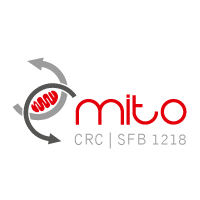B03 | Ubiquitin-dependent coordination of mitochondrial-cytoplasmic quality control

Thorsten Hoppe
CECAD Research Center/Institute for Genetics
University of Cologne
E-mail: Thorsten.Hoppeuni-koeln.de
Phone: +49 - 221 / 478 84218
For more information and contact please visit the HOPPE LAB.
Running time within the CRC 1218: 07/2016 - 06/2024.
Abstract
Mitochondrial functionality is supported by the ubiquitin/proteasome-system (UPS) either degrading damaged proteins or the entire organelle. Besides the role of branched-chain amino acid (BCAA) metabolism in mitochondrial-cytoplasmic quality control, we are interested in the Parkinson’s disease-related E3 ubiquitin ligases Parkin and CHIP, which team up in ubiquitylation of mitochondrial proteins. Mechanistic insights into the crosstalk between metabolic changes, stress signals, and ubiquitin-dependent regulation will help to develop new therapeutic strategies for metabolic and neurodegenerative diseases.
Project-related publications
Li, Q. and Hoppe, T. (2023). Role of amino acid metabolism in mitochondrial homeostasis. Front Cell Dev Biol. 10.3389/fcell.2023.1127618
Hermeling, J. CW., Herholz, M., Baumann, L., Cores, E.C., Zečić, A., Hoppe, T., Riemer, J., Trifunovic, A. (2022). Mitochondria-originated redox signalling regulates KLF-1 to promote longevity in Caenorhabditis elegans. Redox Biology 2022, https://doi.org/10.1016/j.redox.2022.102533
Ravanelli, S., Li, Q., Annibal, A., Trifunovic, A., Antebi, A., Hoppe, T. (2022). Reprograming of proteasomal degradation by branched chain amino acid metabolism. Aging Cell 2022, https://doi.org/10.1111/acel.13725
Balaji, V., Müller, L., Lorenz, R., Kevei, E., Zhang, W.H., Santiago, U., Gebauer, J., Llamas, E., Vilchez, D., Camacho, C.J., Pokrzywa, W., Hoppe T. (2022). A Dimer-Monomer Switch Controls CHIP-Dependent Substrate Ubiquitylation and Processing. Mol Cell. 2022, doi: https://doi.org/10.1016/j.molcel.2022.08.003
Müller, L., Kutzner, C.E., Balaji, V., Hoppe, T. (2021). In vitro analysis of E3 ubiquitin ligase function. J Vis Exp. 171, doi: 10.3791/62393.
Albert, M.C., Brinkmann, K., Pokrzywa, W., Günther, S.D., Krönke, M., Hoppe, T*., Kashkar, H*. (2020). CHIP ubiquitylates NOXA and induces its lysosomal degradation in response to DNA damage. Cell Death Dis. 11:740 *Corresponding author
Hoppe, T., Cohen, E. (2020). Organismal Protein Homeostasis Mechanisms. doi: 10.1534/genetics.120.301283
Ravanelli, S., den Brave, F., Hoppe, T. (2020). Mitochondrial Quality Control Governed by Ubiquitin. Front. Cell Dev. Biol. | doi: 10.3389/fcell.2020.00270
Balaji, V. and Hoppe, T. (2020). Regulation of E3 ubiquitin ligases by homotypic and heterotypic assembly. F1000 Research 2020, 9 (F1000 Faculty Rev), 88.
Tawo, R., Pokrzywa, W., Kevei, E., Akyuz, M.E., Balaji, V., Arian, S., Höhfeld, J., and Hoppe, T. (2017). The Ubiquitin Ligase CHIP Integrates Proteostasis and Aging by Regulation of Insulin Receptor Turnover. Cell 169, 470-482.
Franz, A., Ackermann, L. and Hoppe, T. (2016). Ring of change: CDC48/p97 drives protein dynamics at chromatin. Front. Genet. 7, 73.
Franz, A., Kevei, É., and Hoppe, T. (2015). Double-edged alliance: mitochondrial surveillance by the UPS and autophagy. Curr. Opin. Cell Biol. 4, 37:18-27.
Segref, A., Kevei, É., Pokrzywa, W., Schmeisser, K., Mansfeld, J., Livnat-Levanon, N., Ensenauer, R., Glickman, M.H., Ristow, M., and Hoppe, T. (2014). Pathogenesis of human mitochondrial diseases is modulated by reduced activity of the ubiquitin/proteasome system. Cell Metab. 19, 642-652.
Livnat-Levanon, N., Kevei, É., Kleifeld, O., Krutauz, D., Segref, A., Rinaldi, T., Erpapazoglou, Z., Cohen, M., Reis, N., Hoppe, T., Glickman M.H. (2014). Reversible 26S Proteasome disassembly upon mitochondrial stress. Cell Rep. 7, 1371-1380.
Brinkmann, K., Zigrino, P., Witt, A., Schell, M., Ackermann, L., Broxtermann, P., Schüll, S., Andree, M., Coutelle, O., Yazdanpanah, B., Seeger, J.M., Klubertz, D., Drebber, U., Hacker, U.T., Krönke, M., Mauch, C., Hoppe, T., Kashkar, H. (2013). Ubiquitin C-terminal hydrolase-L1 potentiates cancer chemosensitivity by stabilizing NOXA. Cell Rep. 3, 881-891.
Segref, A., Torres, S., and Hoppe, T. (2011). A Screenable in vivo Assay to Study Proteostasis Networks in Caenorhabditis elegans. Genetics 187, 1235-1240.
Janiesch, P.C., Kim, J., Mouysset, J., Barikbin, R., Lochmüller, H., Cassata, G., Krause, S., and Hoppe, T. (2007). The ubiquitin-selective chaperone CDC-48/p97 links myosin assembly to human myopathy. Nat. Cell Biol. 9, 379-390.
Springer, W., Hoppe, T., Schmidt, E., and Baumeister, R. (2005). A Caenorhabditis elegans Parkin mutant with altered solubility couples α-synuclein aggregation to proteotoxic stress. Hum. Mol. Genet. 14, 3407-3423.
Hoppe, T., Cassata, G., Barral, J.M., Springer, W., Hutagalung, A.H., Epstein, H.F., and Baumeister, R. (2004). Regulation of the Myosin-Directed Chaperone UNC-45 by a Novel E3/E4-Multiubiquitylation Complex in Caenorhabditis elegans. Cell 118, 337-349.
